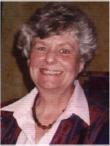The Independent Newsweekly
| National
Catholic Reporter
The Independent Newsweekly |
| Global Perspective |
| May 28, 2003 |
Vol.
1, No. 9
|

Mary Jo Leddy was the founding editor of Catholic New Times, an independent national Catholic newspaper and is the author of the recently released "Radical Gratitude." Polls show the United States is increasingly a land of yea-sayers, of conformists reluctant to question authority and eager to fall in line behind one powerful leader. What has happened to the ideal of "liberty, equality and fraternity"?
|
America Looks More RightBy Mary Jo Leddy TORONTO — The city where I live has been profoundly shaped by the wave of American refugees who came here during the time of the Vietnam War. Many of them stayed and became leaders in local politics. Toronto, once a staid and very British city, is now a place of vibrant neighborhoods, ethnic festivals, coffee shops where chess is played with intensity as onlookers discuss the next wall mural on the street. It has become the most multicultural city in the world. The transformation of Toronto took place largely because of the passionate involvement of transplanted Americans. Why they focused on municipal politics rather than the provincial and federal scene is still the subject of some serious sociological studies. My own theory is that although they had rejected the national policies of the United States they still had an abiding affection for the particularities of the place they had called home. They had what Wendell Berry calls a local affection for that smaller place which was their "beloved country." That commitment was transferred to various localities across Canada. They taught us to care for the particular experiment in civil society that we had taken for granted. Some of these American refugees are my friends. These days they are puzzled and even distressed about what they see happening in the United States. Conversations with their families and friends south of the border often end abruptly. There are relationships that can be sustained only by not talking about the war, about Bush, about the imperial designs of America. There was a time when they couldn't go back home. Now they don't want to. They feel strangely out of place, again. A recent book has articulated their sense of discomfort, the sense of unease that many Canadians feel about the huge nation to the south. The book, "Fire and Ice," summarizes nearly a decade of research into the attitudes and beliefs of Canadians and Americans. Pollster Michael Adams conclusions are, to say the least, surprising. His polling seems to indicate that Canadians and Americans are becoming more different rather than more alike. Canadians are becoming more liberal and Americans more conservative. Consider this shocking statistic: In 2000, 49% of Americans over 15 agreed with this statement: "The father of the family must be the master of his own house." Only 18% of Canadians were willing to grant this unquestioned authority to the father of the family. It seems that the once deferential Canadians are now willing to question almost every form of authority, whether it be familial, ecclesiastical or political. They have distanced themselves from the patriarchal family, organized religion and the political elites. Adams does not mince words: "Americans are materialistic, outer-directed, intolerant, socially conservative and deferential to traditional institutional authority." The poll results, he maintains, show the United States is increasingly a land of yea-sayers, of conformists reluctant to question authority and eager to fall in line behind one powerful leader. Because the data was gathered over a 10-year period, Adams argues that this trend did not begin after 9/11. That terrible event simply gave some impetus to a development that was already well underway. What has happened to the ideal of "liberty, equality and fraternity"? Adams suggests that Americans have not found the security and stability in their social environment that would allow them to assert genuine personal autonomy. He notes that many are turning to family, church, clubs, groups &mdash even gangs &mdash as anchors in an increasingly chaotic world. However, I know that these generalizations about Americans do not apply to my friends (on either side of the border) and most probably don't apply to the readers of the National Catholic Reporter. They are critical of patriarchal structures and of the abuse of authority in the church, and they have been vocal in criticizing the war against Iraq. It now seems clearer how very counter cultural this is. How difficult. How demanding. How necessary. As the bombs were falling on Baghdad, an American friend shared a heart breaking thought with me. "Some days I wonder whether I will have to make a choice between being an American or being a Christian." More liberal Catholics have long felt a tension between their cultural appreciation of freedom and the more authoritarian tendencies of their church. Now they are facing an even greater tension between the basic values of the gospel and the dominant culture of America. They, we, are struggling to hang on to the dream of justice and freedom, which animated the founding of the republic, as the nightmare of Empire shakes us from our dogmatic slumbers. |
| Copyright
© 2003 The National Catholic Reporter Publishing Company, 115
E. Armour Blvd., Kansas City, MO 64111
TEL: 1-816-531-0538 FAX: 1-816-968-2280 |